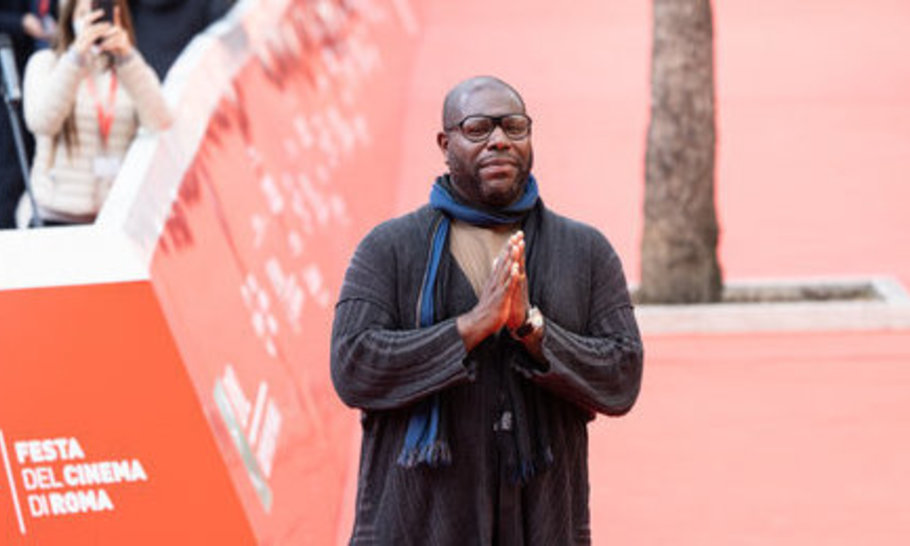A revolution on TV?

Steve McQueen Rome Film Festival 2020 (Matteo Nardone / Pacific Press/Sipa USA)
There is a revolution going on in British television and radio. Suddenly there are more leading Black and Asian figures on top news, sports and drama programmes: Clive Myrie is replacing John Humphrys as the presenter of Mastermind, Alex Scott is replacing Dan Walker as the new presenter of Football Focus, Amol Rajan and Mishal Husain are the first Asian presenters of the Today programme, previously an all-white programme. During the 2020 Euros, both the BBC and ITV had a number of Black pundits, including Alex Scott, Ian Wright, Ashley Cole, Eni Aluko, Rio Ferdinand, Micah Richards and Jermaine Jenas.
Television drama has also undergone enormous changes, with leading Black writers, directors and actors. Last year, Sir Steve McQueen’s five-part series, Small Axe, featured terrific performances by actors including Letitia Wright, John Boyega, Shaun Parkes and Micheal Ward. Michaela Coel created, wrote, co-directed and starred in the BBC1/HBO drama series I May Destroy You (2020), about a young woman’s experience of sexual assault, which received four leading BAFTA awards earlier this year. Hugo Blick cast a number of leading Black actors in his outstanding BBC series, The Shadow Line (2011) and Black Earth Rising (2018), including Chiwetel Ejiofor, Michaela Coel, Tamara Tunie and Lucian Tsamati. One of the most popular TV series of recent years, Line of Duty (2012-the present) cast Lennie James and Thandiwe Newton as leading characters in two of the series and Ace Bhatti played PCC Rohan Sindwhani in series five and six.
Finally, there are Black presenters who broke through into factual programmes. They include the TV historian, David Olusoga, who in the last seven years has presented a number of documentary programmes on slavery, Windrush, Civilisations and Statue Wars; Christopher Jackson, a geoscientist at Manchester University, who became the first Black scientist to present the Royal Institution Christmas Lectures on British television in 2020; and Sir Lenny Henry, who has recently presented a number of music documentaries on the BBC.
From news programmes to history and science, from cop shows to the most acclaimed recent TV series, Black and Asian talent have broken into the TV and radio mainstream in the last ten years or so. This is unrecognisable from the TV culture of the last thirty years of the 20th century. There were popular presenters of children’s programmes, several newsreaders and well-known comedians and entertainers.
What has changed? First, new generations of actors, TV presenters and news readers have grown up in Britain. Ian Wright, Lennie James and Steve McQueen were all born in the Sixties; David Olusoga, Thandiwe Newton, Mishal Husain, Chiwetel Ejiofor and Christopher Jackson in the Seventies; and Amol Rajan, Alex Scott and Michaela Coel in the Eighties.
Second, there is America. American TV and Hollywood have been open to Black talent in a way Britain never was. A number of major Black British actors made their names in American TV and cinema, such as David Harewood (Homeland), Idris Elba (The Wire, then the star of the BBC’s Luther), Cush Jumbo (The Good Wife and The Good Fight, before winning a number of awards for performances on the London stage) and David Oyelowo who started out in BBC1’s Spooks and then moved to Hollywood, playing Martin Luther King in Selma and Don’t Let Go.
Third, and most important, is the Black Lives Matter movement which opened the eyes and minds of TV executives to Black talent, actors, but also writers and directors and, crucially, subjects. McQueen’s drama series on the experience of Black Britons from the Mangrove affair to racism in the British police could never have been commissioned in the 1970s or 1980s. Look at how few dramas in the Play for Today series featured Black actors or stories between 1970-84. Think of how few Black actors had major parts in TV series then, compared with Michaela Coel in Hugo Blick’s Black Earth Rising or in her own series, I May Destroy You. Idris Elba played the title role in Luther and Lennie James and Thandiwe Newton each played the leading role in a whole series of Line of Duty. David Olusoga isn’t just a talking head in his programmes on slavery; he’s the presenter. No sooner had Christopher Jackson presented the Royal Institution Christmas Lectures than he was being interviewed on Radio 4’s The Life Scientific. It took years to have a Black guest on Desert Island Discs. Within 14 months of the murder of George Floyd, there were six Black guests.
But the people who make these decisions are still White. There has been a revolution in representation, but the real revolution will come when we have the first Black Head of News and Current Affairs, Chair of the BBC and Director-General of the BBC. The twelve current members of the BBC Board are all White. Of the ten members of the BBC’s Executive Committee, only one is Black and she is Director of Creative Diversity. Even Channel 4 has only two non-White members of its board. More BAME faces on the board will be the next TV revolution.
A Message from TheArticle
We are the only publication that’s committed to covering every angle. We have an important contribution to make, one that’s needed now more than ever, and we need your help to continue publishing throughout the pandemic. So please, make a donation.





